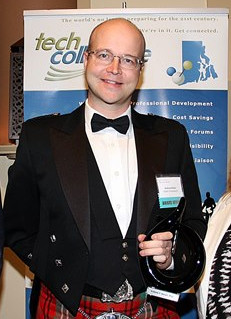
Calista Therapeutics of Lincoln was named as one of the 128 finalists in the latest round of the MassChallenge, the world’s largest startup accelerator and competition.
The finalists participate in a four-month accelerator program, providing entrepreneurs with access to mentors, marketing and media resources, funding opportunities, and free office space. MassChallenge then awards $1 million in grants to the program’s top companies.
Providence Business News asked Andrew Mallon, CEO of Calista Therapeutics, a biopharmaceutical company developing small peptide treatments for cystic fibrosis, to talk about what becoming a finalist means for his startup company.
PBN: What does it mean for Calista Therapeutics to be named a finalist in the MassChallenge therapeutics/life sciences sector?
MALLON: It is truly an honor to have been chosen as a finalist, and even more impressive to us that we were one of five companies especially selected by MassChallenge to showcase to sponsors and the media the high quality of the competition this year.
While we were confident we had an innovative project as well as a professional plan and expert team, as an outsider, you never really know what judges are using as selection criteria, especially when you are a startup and boot-strapped company.
[Being named a finalist] is a greatly appreciated validation of our approach and recognition of our team’s efforts.
MassChallenge provides both a platform and an opportunity to accelerate our business development, optimizing the environment and the people that we interact with, such as mentors and investors.
We can also tap into millions of dollars of key resources that would have been otherwise unavailable, from legal services to something as simple as having a conference room and office space.
Finally, cystic fibrosis is a high unmet medical need, and MassChallenge brings us enhanced visibility to the funding sector and also to patient advocates, and the latter is crucial when we get to the clinical studies. All clinical development is handicapped by patient access.
PBN: As someone who has been engaged here in Rhode Island with emerging cluster groups such as MedMates, how do you see this helping similar companies in Rhode Island?
MALLON: I think simply making companies based in Rhode Island aware of MassChallenge is important way to show early stage companies what they should be trying to achieve.
At first, we were unaware of the significance of being a finalist and what MassChallenge offers us. While we took it seriously, we underestimated the potential.
We are glad that our core strengths enabled us to get to be a finalist, and we plan to leverage the opportunity to both enable our work and also [encourage] other finalists and companies in Rhode Island.
Rhode Island companies and entrepreneurs can learn from our success, along with our core expertise in SBIR grants. We can do as we have done all along: provide insight and help to companies, and all advance as a team rather than individuals.
MassChallenge has global finalists eagerly coming to Boston from as far afield as Nepal and Colombia, which suggests that Rhode Island companies should be flocking to MassChallenge, and they are not. I do not know why.
PBN: How has the sequester in Congress had an impact on the next round of SBIR grants?
MALLON: Sequester has, I believe, significantly decreased, and definitely slowed, the number of small business grants being awarded. This has made the pay lines at which these are funded more competitive, resulting in funding being even harder to obtain.
I know of at least two Rhode Island companies that will likely be denied grants this year due to changes in pay lines, including ourselves, Calista Therapeutics.
Overall, I think the sequester has had greater damage to business due to the uncertainty caused over such an extended period. First, it was: “Was sequester going to happen?” Then, “What effect was it going to have?” And then, “Would it be repealed?”
This uncertainty was in many ways more damaging than the actual cuts as risk-averse companies conservatively put their advances on hold.
It also plays into the hands of venture and angel funders, as it is a buyer’s market and the valuations of companies become depressed as more companies are seeking the same amount of investment money.
At our end of the spectrum, we need low amounts of cash and the first million dollars becomes ever more expensive.
Businesses can only forecast and operate effectively in a climate of reasonable certainty – good or bad. I feel let down by the recent political turmoil and, like most, I am not sure who is to blame, and what we can do to help fix it. If you hurt innovation, you hurt the core of the future of this country.
PBN: How important is the proposed state matching grant legislation proposed by R.I. BioScience Leaders to future viability of companies?
MALLON: This matching program is vital. As a member of the Bioscience Leaders group and an SBIR grantee, I was instrumental in the design of this legislation. I think it is a perfect opportunity for Rhode Island to both foster home-grown commercialization and attract corporations for a relatively small investment from Rhode Island.
SBIR grantee companies always need additional support for the work being conducted, and I for one would like the freedom to think and innovate rather than keep worrying about future fundraising.
I want to be free to be a scientist, drug developer and help patients, but I am often forced into never-ending money-finding exercises, and many of those are just a waste of valuable time.
This matching program can easily help mitigate this issue and free companies to focus on their innovations and collaborations.
I am particularly fond of the most minor provision that provides SBIR grant writing assistance, because I recognized that as a major stumbling block for Rhode Island-based companies. We are experts at grant writing at Calista, and our COO, Gary Robinson, sits on funding review committees, which helps us understand the process and how best to succeed.
Rhode Island has a low rate of SBIR applications and a high rate of failure of those that are submitted. We have a history of helping local companies with SBIRs and remain dedicated to that, but the culture of failure, lack of information and ambition needs to be recognized and remedied.
We cannot fix it alone; the state needs to help.
PBN: What drives you to move forward with your company?
MALLON: First and foremost, it is the desire to make a healthful difference. We can impact patients, their families, and friends. We have an overriding responsibility to them, and we have been fundamentally enabled by their support.
Secondly, it is science-driven, which means collecting results and forming successful collaborations with leading experts. I guess we are science geeks, but we are ones that can make a fundamental difference and provide another birthday, another holiday event, a graduation. This is serious stuff, but it is also intellectually rewarding.
Drug development is the most challenging enterprise and I regularly wish I was diamond mining or making and selling widgets on TV – “but wait, if you order now…” – rather than building almost mythological value around a potential drug candidate over a number of years.
What we do is create risk mitigation for the next investor or collaborator and move the project inexorably towards the next meaningful milestone allowing further investment or innovation.
What we do at Calista is truly innovative, in that we really think proactively and reactively about our projects and plans. We have a mantra that a project needs to be appropriate and acceptable rather than just acceptable, that means we put in thinking time and make strategic decisions.
Perhaps I should define that: a strategic decision is one based on incomplete information that nevertheless we will take and be responsible for. We know within Calista we will be successful, but the key element is knowing on which project.
Key to this success is knowing when to quit, and what data says quit or perpetuate the project as fast as possible. We are perpetuating our cystic fibrosis project; we have a well-defined pipeline and technology platform for a startup company.













Biotech shoulld be funded either at the university research level and if private at the venture capital/private equity level. Quit complaining about govt funding. Sequester isn’t fair but either is spending $billions beyond what we take-in. Govt cost cutting needs to start somewhere. Venture funded healthcare development is one place it should not fund. NIH grants to universities-hospitals shouldn’t be cut but until Congress gets act together (along w/ President) that isn’t going to change.